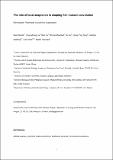Files in this item
The role of local adaptation in shaping fish-mussel coevolution
Item metadata
| dc.contributor.author | Douda, Karel | |
| dc.contributor.author | Liu, Huan-Zhang | |
| dc.contributor.author | Yu, Dan | |
| dc.contributor.author | Rouchet, Romain | |
| dc.contributor.author | Liu, Fei | |
| dc.contributor.author | Tang, Qiong-Ying | |
| dc.contributor.author | Methling, Caroline | |
| dc.contributor.author | Smith, Carl | |
| dc.contributor.author | Reichard, Martin | |
| dc.date.accessioned | 2018-09-11T23:35:38Z | |
| dc.date.available | 2018-09-11T23:35:38Z | |
| dc.date.issued | 2017 | |
| dc.identifier | 250861523 | |
| dc.identifier | 39c53c42-358c-4016-9c09-afa4e0cc8304 | |
| dc.identifier | 85029365430 | |
| dc.identifier | 000412992700005 | |
| dc.identifier.citation | Douda , K , Liu , H-Z , Yu , D , Rouchet , R , Liu , F , Tang , Q-Y , Methling , C , Smith , C & Reichard , M 2017 , ' The role of local adaptation in shaping fish-mussel coevolution ' , Freshwater Biology , vol. Early View . https://doi.org/10.1111/fwb.13026 | en |
| dc.identifier.issn | 0046-5070 | |
| dc.identifier.other | ORCID: /0000-0003-3285-0379/work/47136201 | |
| dc.identifier.uri | https://hdl.handle.net/10023/16011 | |
| dc.description | Funder: Czech Science Foundation (13-05872S). | en |
| dc.description.abstract | 1. The survival of affiliate (dependent) species in a changing environment is determined by the interactions between the affiliate species and their available hosts. However, the patterns of spatial and temporal changes in host compatibility are often unknown despite host shifts having direct impact on the persistence of local populations. Bivalves of the order Unionida (freshwater mussels) are a functionally important but declining group of affiliate species, which are dependent on freshwater fish to host their parasitic larvae. The role of local adaptations and host fish resistance in shaping freshwater mussel host relationships remains poorly understood. 2. We used an invasive East Asian unionid bivalve, Sinanodonta woodiana, and its potential host fishes to study the mechanisms shaping fish-mussel coevolution using a combination of laboratory cross-exposure methods and field-collected data. We tested whether generalist host use of S. woodiana is pertinent to native host species, with special attention to bitterling fishes (Cyprinidae: Acheilognathinae) that are characterised by a mutual association with freshwater mussels. We also tested whether the pattern of the parasite–host association varies temporally (between areas of ancient and recent sympatry) and spatially (at a sub-basin level in its native range). 3. Results revealed the ability of S. woodiana to widely exploit non-bitterling host fishes at a global scale. In contrast, the ability of S. woodiana to exploit closely associated bitterling fishes was low in its native range (with ancient sympatry). In areas of recent sympatry (non-native S. woodiana range in Europe), S. woodiana glochidia were demonstrated to readily parasitise local, evolutionarily naive bitterling species at high density. 4. The results of a population-level experiment with three native populations of S. woodiana and rose bitterling, Rhodeus ocellatus, from various sub-basins of the River Yangtze confirmed that mussel populations vary in their compatibility with particular host populations. However, there was no evidence of population-specific adaptive coevolution. 5. This study provides the first evidence for a role of fish counter-adaptations against freshwater mussel glochidia, and documents the importance of population-level variation in shaping compatibility between glochidia and their host fishes. This outcome can inform predictions on the impact of biotic homogenisation on endangered affiliate species in general and freshwater mussels in particular. | |
| dc.format.extent | 2090125 | |
| dc.language.iso | eng | |
| dc.relation.ispartof | Freshwater Biology | en |
| dc.subject | Affiliate species | en |
| dc.subject | Glochidia | en |
| dc.subject | Host relationships | en |
| dc.subject | Freshwater bivalves | en |
| dc.subject | Sinanodonta woodiana | en |
| dc.subject | QH301 Biology | en |
| dc.subject | SH Aquaculture. Fisheries. Angling | en |
| dc.subject | NDAS | en |
| dc.subject.lcc | QH301 | en |
| dc.subject.lcc | SH | en |
| dc.title | The role of local adaptation in shaping fish-mussel coevolution | en |
| dc.type | Journal article | en |
| dc.contributor.institution | University of St Andrews. School of Biology | en |
| dc.identifier.doi | https://doi.org/10.1111/fwb.13026 | |
| dc.description.status | Peer reviewed | en |
| dc.date.embargoedUntil | 2018-09-12 | |
| dc.identifier.url | http://onlinelibrary.wiley.com/doi/10.1111/fwb.13026/full#footer-support-info | en |
This item appears in the following Collection(s)
Items in the St Andrews Research Repository are protected by copyright, with all rights reserved, unless otherwise indicated.

